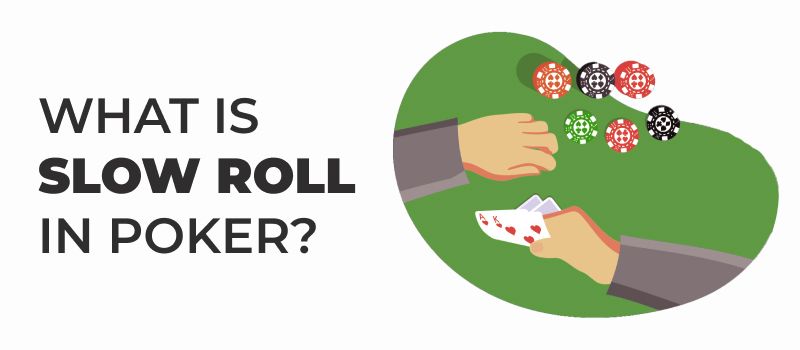What Is The Slow Roll In Poker and how to avoid it?
Slow rolling in poker is one of those elements that can test your nerves or even be considered toxic. Many see it as a disrespectful move toward opponents, building tension before revealing cards. Others use it as a psychological trick to apply pressure for hands to follow and to establish a rival reputation at the table. In this article, we will delve into the psychology of the slow roll in poker and provide useful insights that you can apply in Canadian casinos.
What is Slow Rolling In Poker?

It involves taking an extended amount of time to reveal your winning hand when you are sure no other player at the table can beat you. This usually happens after all bets have been placed and players are ready for a showdown. Instead of immediately showing their hand, the player will pause for an extended period, creating tension and anticipation among their opponents.
There are different ways to expose the winning slow roll - some choose the annoying, knowing smile. Others choose a toxic "oh no, I've lost - just kidding, I have won" approach.
Why is Slow roll a bad tactic?
Even though some players favor this tactic, the majority tend to avoid it, recognizing how frustrating it can get for others. Here are four theories as to why the slow roll is a big no-no:
It is disrespectful to your opponent.
When you slow roll, you signal to your opponent that they are not worthy of a quick and honest reveal, which comes across as rude and arrogant. While poker is a game of strategy and skill, maintaining good sportsmanship is key.
It can backfire on you.
Though slow rolling may bring a temporary sense of dominance, it can negatively impact how other players perceive you for the rest of the game. Moreover, no matter how confident you are in your hand, you can never be sure of what your opponent is holding.
It goes against the spirit of the game.
Slow rolling goes against the core integrity principles of the game and can create a hostile atmosphere at the table. It takes away from the true essence of poker: outsmarting your opponents with skill and strategy, not bad-mannered behavior.
It can ruin the overall experience for everyone involved.
It's not just the unnecessary pressure that may frustrate other players but also the extra time it wastes for everyone at the table. Repeated slow rolling can spoil the friendly atmosphere by showing a lack of respect for others time.
How to Recognize the Use of Slow Roll?
There are several ways to spot a slow roller at your poker table. Below, we’ve compiled a list of tips to help you recognize one.
-
Card Double-check. If you notice a player constantly checking their cards, it might signal a potential winning hand, which can cause a slow roll.
-
Overall Behaviour. Certain manners in speech and body language, such as sarcastic comments, prolonged pauses, or extended eye contact, can help you identify a slow roller, so be sure to analyze the overall behavior of players.
-
Exploiting Emotions. Slow rollers tend to manipulate your emotions during play, not only by taking longer to show their cards or bluffing but also by provoking you with their expressions or even words.
-
Turning In Last. If a player consistently turns their hand last, this can also be flagged as a slow-roller tendency.
A Famous Slow Roll Example
It's one of the most famous clips on the internet and one of the best examples of the practice going badly wrong.
At the Irish Open, eight people were left on the final table, with each player having fought off a massive field to guarantee some serious prize money and a shot at a prestigious title.
Andreas Gann had flopped an ace-high flush with the king of diamonds in his holding - colloquially referred to as the nuts. His opponent, Irish poker legend Donnacha O'Dea, flopped two pair. The money always looked likely to go in the middle for a heads-up showdown, and indeed O'Dea obliged, forcing his opponent all in.
Inexplicably, Gann spent nearly a minute deliberating before making the call.
Sweet justice was about to occur, however. O'Dea filled up on the river to make a Full House and send his opponent packing.
Commentators remarked at the time: "This is absolutely disgraceful". You can find the clip at the bottom.
Help us to 100K Subscribers - http://goo.gl/Bvsafo If you are reading this, comment... ● Watch other Videos: ► Bluffs Gone Wrong - https://youtu.be/ffawyLHW4fY ► Phil Ivey Wins $2,200,000 - https://youtu.be/GvSFls_LtkA ► Top Straight Flushes - https://youtu.be/XEe3LCL34Tg ► Best Poker Quads - https://youtu.be/NaA4CsAzdNM
Slow rolling VS Hollywooding
Slow rolling is frequently mistaken for Hollywooding, but the two techniques are entirely different. Read the comparison below to discover the key differences.
Slow Rolling
-
It can only happen at showdown, without any impact on the outcome.
-
Creates frustration and angers other players at the table.
-
Considered one of the most disrespectful behaviors in poker.
-
Less common in professional games.
-
Damages a player's reputation at the table.
Hollywooding
-
Players deliberately exaggerate their decisions as part of a bluff.
-
Can happen at any stage of a hand, misleading other players if executed correctly.
-
Considered a bad tone only if done consistently and without genuine thought.
-
A legitimate strategic move that can impact the outcome.
-
If played well, it may boost your confidence and reputation at the table.
Summary
To sum up, in poker, a slow roll is a delay in revealing a winning hand, which often causes heated disputes as some players consider this behaviour harmful to the integrity of the game, while others see it as a useful psychological tactic. Fortunately, in online gambling, these methods are not used in live poker rooms or random number generation games, resulting in a more relaxed atmosphere. Use our Canadian online casino reviews to identify reputable sites that provide more secure and equitable gaming experiences.
FAQ
Is Slow Rolling Against Official Poker Rules?
No, slow rolling is not prohibited by poker rules; however, it is considered poor etiquette, which violates the unspoken good sportsmanship rules.
Is Slow Rolling Ever Acceptable?
Though accepted by poker rules, it is frowned upon by professional players. Slow rolling is more common in private settings.
What are the Consequences of Slow Rolling?
As a rule, slow rollers don’t get much friendly feedback from other players, as they make everyone wait, which can significantly damage their reputation at the table.
Why Do Players Slow Roll?
Slow rolling usually occurs when a player has a strong hand and is confident in their win, unnecessarily drawing attention to it at the table. However, it can also happen when a player has lost and is simply trying to irritate others to apply further pressure.
What's the difference between Slow Roll and Slow Play?
While a slow roll is used to mock and taunt opponents, slow play is an actual tactic focused on deceiving other players and extracting more value.
Should You Use The Slow Roll In Poker?
Good sportsmanship should not be overlooked; it is best to avoid slow rolling to maintain respect and a positive tone with other players.










